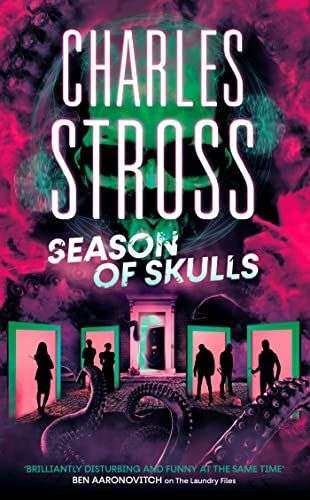SEASON OF SKULLS by Charles Stross
Orbit, HC, £20.00
Reviewed by Pauline Morgan

Embarking on a series of novels can often seem like a good idea. Many readers like to be able to follow their favourite characters through various adventures and see them change and grow in the process. For the author, it can be a challenge as there is a danger of repeating a formula the readership has approved of. For some, such as in crime fiction, that is all that is desired. Other writers like to stretch their abilities and take the characters in unexpected directions in the hope that the fresh approaches will not only keep the readership but will attract more. Charles Stross doesn’t want to do the expected.
Season of Skulls is the twelfth volume of The Laundry Files sequence. This started with The Atrocity Archives. Compared with later volumes in the series, this is relatively low-key, focusing on a secret government department that deals with magical incidents. Throughout the series, the action becomes more frenetic and decidedly darker. By the time the last three books are reached, Lovecraftian forces have awakened. The English Prime Minister is an avatar of N’yar Lat-Hotep, the Black Pharaoh. He has taken over the country and imposed draconian laws.
The focus of this novel is Eve Starkey. She started as an assistant to Baron Rupert de Montfort Bigge. Due to her brother’s incompetence, she finds that she has married Rupert by proxy, but he has now disappeared. Though she cannot reveal it, she has sent him along the dream paths in search of a powerful book of magical spells, then sealed the passage so he cannot get back. His Dread Majesty summons her and demands that she prove Rupert is dead by producing his skull. She does, but unfortunately, it is the wrong one – the dream paths lead to different realities.
Then Rupert reappears. He reveals his plans to depose N’yar Lat-Hotep to Eve, thinking she is in his thrall. Once he has gone back into the dream paths, Eve follows. She ends up in an 1816 version of Port Merion as Number Six. Fans of The Prisoner TV series will recognise a lot of the elements. Stross has clearly had a lot of fun writing this section of the novel. Eve, though, has the problem of trying to escape and get to London if she is to stop Rupert’s schemes.
This a book that will divide readers. Those who have no idea what The Prisoner is or have only heard of it will be confused and fail to understand the significance of many of the actions. Fans of the TV show will be divided into those who will search for the references and enjoy the spin Stross has put on it. Others will consider what he has done is sacrilege. I can appreciate his intentions as well as the way he also plays with Mary Shelley’s Frankenstein. The problem I have is that Stross spends too long explaining some aspects and doesn’t fully engage the reader in the plot. Overall, this volume doesn’t have the impact of the other novels in the series, and it would probably be a mistake for newcomers to start here.